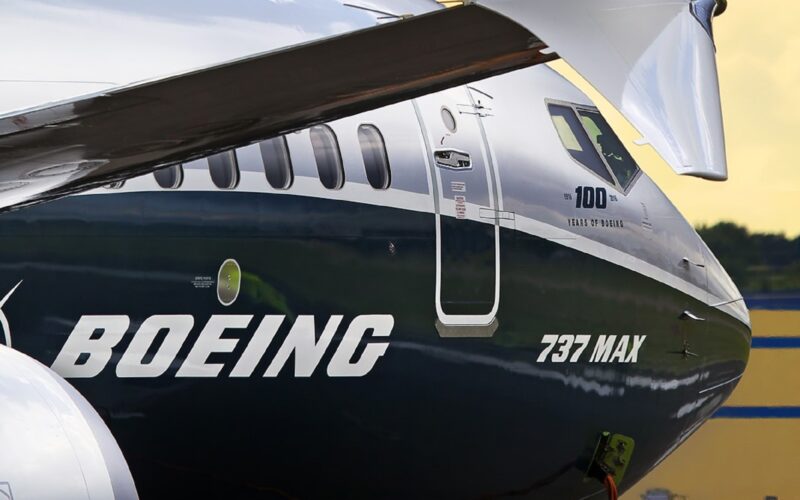The National Transportation Safety Board (NTSB) has issued an urgent safety recommendation to Boeing and the Federal Aviation Administration (FAA) following an incident at Newark Liberty International Airport (EWR) in February 2024, when the rudder pedals jammed on a United Airlines 737 MAX 8.
The aircraft potentially affected include certain Boeing 737NGs and 737 MAXs equipped with a Collins Aerospace SVO-730 rudder rollout guidance actuator that tests found to be defected.
The captain of the United Airlines flight involved in the incident reported that, during the landing rollout, the rudder pedals failed to move in response to the “normal” application.
In subsequent tests at the Collins Aerospace facility in Cedar Rapids, it was found that during “cold soaking” the actuators’ function was “significantly compromised”.
“Investigators found evidence of moisture in both actuators, which failed testing. Collins Aerospace subsequently determined that a sealed bearing was incorrectly assembled during production of the actuators, leaving the unsealed side more susceptible to moisture that can freeze and limit rudder system movement,” the NTSB said in its urgent safety recommendation on September 26, 2024.
According to the NTSB, Collins notified Boeing that “more than 353 actuators that Collins had delivered to Boeing since February 2017 were affected by this condition”.
Boeing’s 737 flight manual instructs pilots confronted with a jammed or restricted rudder to “overpower the jammed or restricted system [using] maximum force, including a combined effort of both pilots”.
The NTSB said that it is concerned that Boeing’s “mitigation to overcome a jammed or restricted rudder control system during landing could also result in a large input to the rudder pedals and a sudden, large and undesired rudder deflection sufficient to cause loss of control or departure from the runway”.
And the scenario could become even more concerning if a high-crosswind or an engine-out condition were to occur simultaneously with a jammed or restricted rudder.
On August 28, 2024, Boeing notified the NTSB that 25 US-registered planes have or had an affected SVO-730 rudder rollout guidance actuator installed.
Boeing advised that nine of the 25 aircraft were operated by United Airlines and that all the actuators installed on those planes had already been removed.
Boeing added that the remaining 16 US-registered planes were leased to foreign operators.
In its urgent safety recommendation, the NTSB noted that there is “uncertainty” regarding how many affected actuators are currently installed on planes, including those flying with foreign operators.
“As a result, there could be additional Boeing 737 airplanes beyond those 25 delivered by Boeing that have incorrectly assembled bearings in their SVO-730 rudder rollout guidance actuators, and it is essential that this possibility is clearly addressed,” the NTSB said.
Boeing has indicated that 737 airplanes can be safely flown without the rudder rollout guidance actuator installed and that it issued information about the actuator to both domestic and foreign operators on August 23, 2024.
In the message to operator, Boeing stated that it had determined the issue posed “no immediate threat to safety”.
However, Boeing added that, to reduce “any unnecessary risk” within the 737 fleet, it would develop a plan to remove the affected actuator units from the fleet and replace them with conforming units.
Boeing indicated that its plan and the associated timeline would be shared when available with 737 operators.
The NTSB accepts that the removal of Collins Aerospace SVO-730 rudder rollout guidance actuators with incorrectly assembled bearings from Boeing 737 planes would eliminate a potential cause of a restricted rudder control system on those planes. However, operators of the aircraft would be precluded from performing category IIIB approaches.
During the United Airlines incident in February 2024, there was no damage to the plane, registered N47280, or any injuries experienced by the 155 passengers and six crewmembers.
NTSB’s four recommendations
The NTSB is issuing two urgent safety recommendations to Boeing and two to the FAA.
The NTSB has recommended that Boeing “determine appropriate flight crew responses besides applying maximum pedal force” for such situations in flight or during landing.
The NTSB also recommended that Boeing notify flight crews operating 737s with affected actuators that the rudder control system can jam, due to moisture that has accumulated inside the actuators and frozen.
Additionally, the NTSB suggested that the FAA should determine if actuators with incorrectly assembled bearings should be removed from planes, and if so, direct US operators to do so until replacements are available.
A further NTSB recommendation is that, if the FAA determines the affected actuators should be removed, it should notify aviation regulators in other countries that oversee operators of Boeing 737 planes and encourage them to require removal of the affected actuators until replacements are available.

